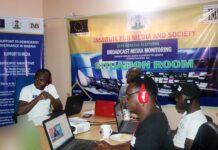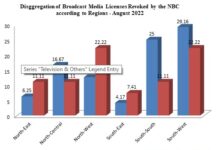 In constructing and structuring a positive identity for Nigeria, experts have stressed that the mass media and technology are key tools to achieving this elusive goal.
In constructing and structuring a positive identity for Nigeria, experts have stressed that the mass media and technology are key tools to achieving this elusive goal.
They made this known while speaking recently at the seventh edition of ‘Innovention’ Series, organised by Verdant Zeal Marketing Communications Group in Lagos.
Panel members argued that it was high time the media stopped focusing on negativities in the country such as corruption, nepotism, and ethnicity, which create a feeling that the country is not good but that it should project positive aspects of the country instead.
Mrs. Bolanle Austin-Peters, who gave the keynote address, said the need to repackage Nigeria could not be over-emphasised, while speaking on ‘Building Africa’s Reputation through Mediatainment.’
The CEO of Terra Kulture and producer of Wakaa and Saro musical theatres argued that Africa and Nigeria’s reputation in the international community was that of despair, poverty, famine, lack of education, malnourished children and everything negative, saying these were the reputation projected to the world or what the world has chosen to write about Africa.
She stressed that the Nigerian media has a lot to do in recreating the narratives about the country to the rest of the world, adding, “We need the media to support entertainment. We are a people known for rich cultural heritage in music, art, food; everything about us depicts creativity.
The problem is, we have failed to harness all what we have and package them properly to the world. Nigeria could package her incredible food and make it a serious revenue earner and the same goes for the arts.
“Americans are perceived as a people who are developed because they have been able to package themselves in such a way that everybody believes that they are the best country in the world. But what is the yardstick for becoming a great nation?”
Austin-Peters said Nigeria’s failure to keep records has led foreigners to tell distorted stories about her, and lamented, “We are not projecting our clothes – the adires, the aso-okes and so on.
Look at the Indians and Arabs; they are always in their attires. I think it is inhuman to wear jackets in Africa because the climate does not allow it. We just love to follow the western world; it’s almost as if we have a ‘mumu’ syndrome in us.
“Imagine if all Nigerians wear only clothes made in Nigeria? Do you know how much revenue that would generate for the nation? Our inability to innovate and think of new ideas is what is killing us as a people.
Technology is the key to international packaging, and as long as we don’t use it, we are going to remain a backward people.”
According to her, media and technology must be deployed to aid packaging, adding, “There must also be a meeting point for technology and our culture.
Some of our shows at Terra Kulture are not the best in the world but they had to do with the fact that we employed technology. The government needs to change the way it employs culture as a diplomatic tool.
Government needs to sell our culture and make it attractive and provide adequate information about Nigeria that it is a beautiful place to be. The policies are there, but lack implementation.
The industry practitioners themselves need to be more creative and produce high quality entertainment for the world to appreciate.”
Principal Consultant of Lonadek Oil and Gas, Ibilola Amao, who was event’s chairperson, said the seventh edition of the series reflects on art, culture and theatre as areas where Nigeria has a lot of potential that could be harnessed to drive wealth.
“Rather than complain about problems and issues we have in Nigeria,” Amao said, “we should see opportunities to create wealth. Information technology is a platform whereby we can actually help a lot of artists,” adding that gaming and multimedia were other revenue generation areas yet to be tapped into in Africa.
Founder and publisher of BusinessEye magazine, Ibim Semenitari said the reputation of Nigeria was being managed by the content presented to the world, hence she chose to be a publisher so as to “tell our story differently, as others were informing the narratives for us.”
Nollywood actor, Mr. Ramsey Nouah, also a panel member, said there was a need to have a platform, an enabling environment for entertainment to thrive, noting, “Nigeria’s story is likened to the biblical story of making bread out of stone – no strategy or plan. Where is our vision and mission? Government must create a conducive society where basic needs are easily available for citizens to strategise and be creative.”
Another member, Mr. Nelson Jackson, said that the media was the key to redeeming Nigeria’s reputation: “Without the medium, the news will not be news.
In my academy, we use technology to train and rehabilitate area boys (street urchins) and we have converted them to engineers, logistics managers and so on, all thanks to the power of information via the media. Creativity is just a twist from normal.”
Founding partner of Law Allianz, Yahaya Maikori, argued that there was a convergence between media and technology. He said that the real issues were that of culture and copyright laws and that an infringement on a copyright could lead to court action, adding, “On the other hand, the industry people do not know their rights, and how to protect their content. They need to consider hiring professionals to assist them in structuring their businesses.”
A panelists and CEO of Sodium Brand Solutions, Bisoye Fagade, said technology has made media work very easy, as it put information at the tip of the finger. He argued that Nigeria needed a good strategy to create opportunities and capture them.
According to him, “The problem we have is that we don’t have the time and patience to invest in what we do. You don’t throw a monkey to catch banana but you throw banana to catch a monkey. So, if we understand that media is the key, then put the appropriate budget and you get what you require.”
Ace comedian, Atunyota Alleluya Akpobome, popularly known as Alibaba, said Nigeria must look inward to redeem her reputation, adding, “We need to develop everything we have within. We have crude, cocoa, rubber, and so on, which are being exported (at raw state) and then imported back,” as finished products with real value.
Earlier, Convener of the Series and Executive Vice Chairman of Verdant Zeal Group, Dr. Tunji Olugbodi, noted, “There are many observers who believe that the global reach of African content could take off, led by video on demand (VoD), powered by the internet and strong distribution networks.
This is driven by the popularity of Nigerian content across Africa and the diaspora.
Olugbodi said the narrative about Africa had been changing because of the evolution experienced in the creative industry, which is engendered by technology, adding, “About two decades ago, Africa had an ignoble past as a continent ridden with corruption and it was renowned for poverty, human rights violations amongst others.
However, the narrative has started changing as Africa is currently credited with many global creative works, which have been amplified through media exposure and the Internet. The creative industry has changed the perspective about Africa.”















